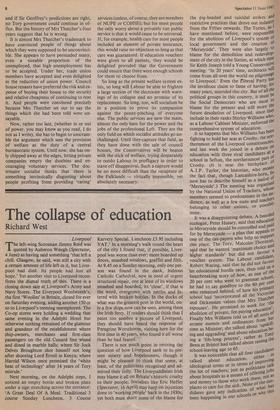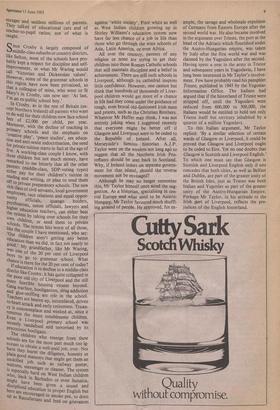The collapse of education
Richard West
The left-wing Scotsman Jimmy Reid was quoted by Auberon Waugh (Spectator, 4 June) as having said something 'that left a chill. Glasgow, he said, was still a city with a certain amount of life left in it, but Liver- pool had died. Its people had lost all hope.' Yet another visit to Liverpool recon- firms the dismal truth of this. There is a closing down sale at Liverpool's Army and Navy Stores. The Liverpool Woolworth's, the first 'Woolies' in Britain, closed for ever on Saturday evening, adding another 150 or so to Liverpool's teeming unemployed. The Co-op stores were holding a wedding that same evening in the Ade1phi Hotel but otherwise nothing remained of the glamour and grandeur of the establishment where ship-owners, merchants and first-class passengers on the old Cunard line wined and dined in marble halls; where Sir Jock Delves Broughton shot himself not long after shooting Lord Erroll in Kenya; where Harold Wilson once promised the 'white heat of technology' after 14 years of Tory misrule.'
Next morning, on the Ade1phi steps, I noticed an empty bottle and broken plate under a sign stretching across the entrance: 'A Great Deal Of A Meal. Traditional 3 course Sunday Luncheon. 3 Course Karvery Special. Luncheon £3.95 including VAT.' In a morning's walk round the heart of the city I found that, if possible, Liver- pool was worse than ever: more boarded up doors, smashed windows, graffiti and filth. At 9.45 on a Sunday morning, only one per- son was found in the dank, hideous Catholic Cathedral, now in need of urgent structural repair, one at least of its windows smashed and boarded, its 'close', if that is the word, overgrown with nettles and lit- tered with broken bottles. In the docks of what was the greatest port in the world, on- ly a few ships now can be seen, among them the Irish ferry. If readers should think that I paint too sombre a picture of Liverpool, they should have heard the response of Peregrine Worsthorne, visiting here for the first time in 40 years, who found it all worse than he had feared.
There is not much point in reviving the question of how Liverpool sank to its pre- sent misery and hopelessness, though it might be pleasant to think that some, at least, of the politicians recognised and ad- mitted their folly. The Liverpuddleian Irish may blame it all on Britain's historic cruelty to their people; Socialists like Eric Heffer (Spectator, 16 April) may harp on injustices done to 'working people' back in the 1930s; yet both must share some of the blame for
the pig-headed and suicidal strikes and
restrictive practices that drove out industrY from the Fifties onwards. The Tories, as I have mentioned before, were responsible for the abolition of Liverpool's system of local government and the creation of 'Merseyside'. They were also largely to blame for the demolition and redeveloP ment of the city in the Sixties, at which tittle Sir Keith Joseph told a Young Conservative meeting: 'In 20 years' time, architects will come from all over the world on pilgrimage to Liverpool.' Even the )liberal Party has the invidious claim to fame of having, for many years, misruled this city. But of all the political groups in this country, it must be the Social Democrats who are most to blame for the present and still more the future desolation of Liverpool, since they include in their ranks Shirley Williams who' as a Labour Cabinet Minister, enforced the comprehensive system of education.
It so happens that Mrs Williams has been
fighting to hold her seat at Crosby, the nor- thernmost of the Liverpool constituencies, and last week she joined in a debate on education with three rival candidates at a school in Sefton, the northernmost part Of, Crosby. (It is near the birthplace 0' A.J.P. Taylor, the historian, who moans the fact that, though Lancashire-born, he now has to describe himself as a native of 'Merseyside'.) The meeting was organised by the National Union of Teachers, whose members seemed to predominate in the au- dience, as well as a few nuns and teachers belonging to other unions, or possibly n It was a disappointing debate. A bearded ecologist, Peter Hussey, said that educatio.n. in Merseyside should be controlled and PO for by Merseyside — a plan that appe"ls to one of the tax-payers who help to supPort this place. The Tory, Malcolm Thornton! said that he wanted 'maximum choice and higher standards' but did not favour a voucher system. The Labour candidate, Robert Waring, said that he did not favour
an educational hurdle race, then told us
heartbreaking story of how, as one of the 20 per cent who went to grammar schco eon; he had to say goodbye to the 80 per. who remained behind; of how his prirrlrYn school had 'incorporated all the Victoria and Dickensian values that Mrs Thatcher e espouses'. He promised to work for. nil,. abolition of private, fee-paying educatio Finally Mrs Williams told us of all sorts of arcane memos and ordinances from time as Minister; she talked about 11.P1(.1. ing and upgrading' and about educatioTnona ing a 'life-long process', rather as t. Y_ school-leaving atleBariv isntgolahgaedtotal6k5e.d about raising the ideological terms or in terms of pr as naobtoicuetableedthuacat education, eithercandidate.ns erirs°v gt: talked about the lot of teachers; just as politeiCiha. about hospitals as a means of offering and money to those who work there, not places to care for the sick. None owfaeyt has didates gave any indication of
this been happening in our schools or why
enrages and saddens millions of parents. They talked of educational cuts and of teacher-to-pupil ratios; not of what is taught.
Since Crosby is largely composed of middle-class suburbs or country districts, like Sefton, a most of the schools have pro- bably kept respect for discipline and self- improvement, or what Mr Waring would call 'Victorian and Dickensian values'.
i However, some of the grammar schools in this region have now been privatised, so that a colleague of mine, who went to St Mary's in Crosby, can now say: At last, I'm an ex-public school boy.' In Crosby, as in the rest of Britain (ex- cept Northern Ireland) all parents who want to do well for their children now face school fees of £2,000 per child, peryear. Moreover, with the decline of teaching in primary schools and the emphasis on 'creative play', 'peace studies', sex educa- tion and anti-sexist indoctrination, the need for private tuition starts in fact at the age of five. A working-class couple I know, with three children but not much money, have remarked to me bitterly that all the other
parents (middle-class, SDP-voting in either pay for their children's tuition n reading and writing, or plan to send them off to private preparatory schools. The new rich class of civil servants, local government employees, race relations and equal oppor- tunity officials, quango holders, psychiatrists, union officials, lawyers and higher education teachers, can either beat the system by taking over schools for their own children, or send them to private schools. The system hits worst of all those, like the couple I have mentioned, who say: Our children aren't getting any better education than we did, in fact not nearly so good-' My grandfather, like Mr Waring, was one of the 20 per cent of Liverpool boys to go togrammar school. What chance is there for the 20 per cent of today? If education is in decline in a middle-class district like Crosby, it has quite collapsed in the Poor old city of Liverpool and the still more horrible housing estates beyond. Gang warfare, hooliganism, drug addiction and glue-sniffing are rife in the school. Teachers are beaten up, intimidated, driven to.h is attack and early retirement. Truan- cy s commo —
nplace and winked at, since it
Eremoves the more troublesome children. ven a Liverpool primary school was ecently vandalised and terrorised by its Precocious hooligans. The children who emerge from these schools are for the most part much too ig- norant to obtain a well-paid job, ever. Nor have they learnt the diligence, honesty or Plain good manners that might get them an unskilled job such as railway porter, anress, messenger or cleaner. The system is especially hard on West Indian children wh. o, back in Barbados or even Jamaica, might have been given a sound and disciplined education in proper English but here are encouraged to smoke pot, to dress up as Rastafarians and feed on grievances
against 'white society'. Poor white as well as West Indian children growing up in Shirley Williams's education system now have far less chance of a job in life than those who go through the state schools of Asia, Latin America, or even Africa.
All over the country, parents of any religion or none are trying to get their children into those Roman Catholic schools that still maintain discipline and a belief in achievement. There are still such schools in Liverpool, although its cathedral inspires little confidence. However, one cannot but think that hundreds of thousands of Liver- pool children would get more of a chance in life had they come under the guidance of tough, even brutal old-fashioned Irish nuns and priests, such as the Christian Brothers. Whatever Mr Heffer may think, I was not entirely joking when I suggested recently that everyone might be better off if Glasgow and Liverpool were to be ceded to the Republic of Ireland. After all, Merseyside's famous historian A.J.P. Taylor went on the wireless not long ago to suggest that all the Northern Irish Pro- testants should be sent back to Scotland. Why, if Ireland insists on separate govern- ment for that island, should the reverse movement not be envisaged?
Although he may no longer remember this, Mr Taylor himself once aired the sug- gestion. As a historian, specialising in cen- tral Europe and what used to be Austro- Hungary, Mr Taylor favoured much shuffl- ing around of people. He approved, for ex- ample, the savage and wholesale expulsion of Germans from Eastern Europe after the second world war. He also became involved in the argument over Trieste, the port at the head of the Adriatic which flourished under the Austro-Hungarian empire, was taken by Italy after the first world war and was claimed by the Yugoslays after the second. Having spent a year in the army in Trieste and subsequent years in Yugoslavia, I have long been interested in Mr Taylor's involve- ment. Few have probably read his pamphlet Trieste, published in 1945 by the Yugoslav Information Office. The Italians had argued that if the hinterland of Trieste were stripped off, until the Yugoslays were reduced from 600,000 to 300,000, the Italians would be entitled to hold not only Trieste itself but territory inhabited by a quarter of a million Yugoslays.
To this Italian argument, Mr Taylor replied: 'By a similar selection of certain wards of Glasgow or Liverpool, it could be proved that Glasgow and Liverpool ought to be ceded to Eire. Yet no one doubts that Glasgow is Scottish and Liverpool English.' To which one must say that Glasgow is Scottish and Liverpool English only if one concedes that both cities, as well as Belfast and Dublin, are part of the greater unity of the British Isles, just as Trieste was both Italian and Yugoslav as part of the greater unity of the Austro-Hungarian Empire. Perhaps Mr Taylor, in his attitude to the Irish port of Liverpool, reflects the pre- judices of the English hinterland.











































 Previous page
Previous page